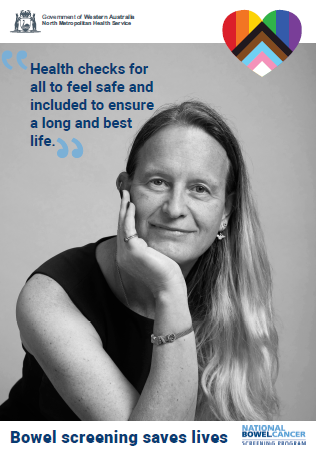International Trans Day of Visibility - 31 March

Today is International Transgender Day of Visibility, a day dedicated to celebrating transgender people and their accomplishments.
For Trans Day of Visibility, the National Bowel Cancer Screening Program (NBCSP) (external site) in WA are celebrating their very own hero: Alyce.
Alyce is one of the bowel screening advocates encouraging everyone to take part in the National Bowel Cancer Screening Program.
The National Bowel Cancer Screening Program sends bowel screening test kits to eligible Australians aged 50-74. If detected early, bowel cancer can be successfully treated in more than 90 per cent of cases. Bowel cancer testing is free, easy to do and can be completed in the comfort of your own home.
Age is the number one risk factor so everybody from the age of 50, regardless of gender and sexuality, should screen for bowel cancer.
The LGBTQI+ Cancer Screening Campaign has been developed by the WA cancer screening programs for bowel, breast and cervical to promote the message “Screening saves lives”. The WA three cancer screening programs continue to strive to reflect the diversity of the LGBTQI+ community in the “Screening Saves Lives” campaign. If you wish to join this campaign, please contact wacpcn@health.wa.gov.au.

